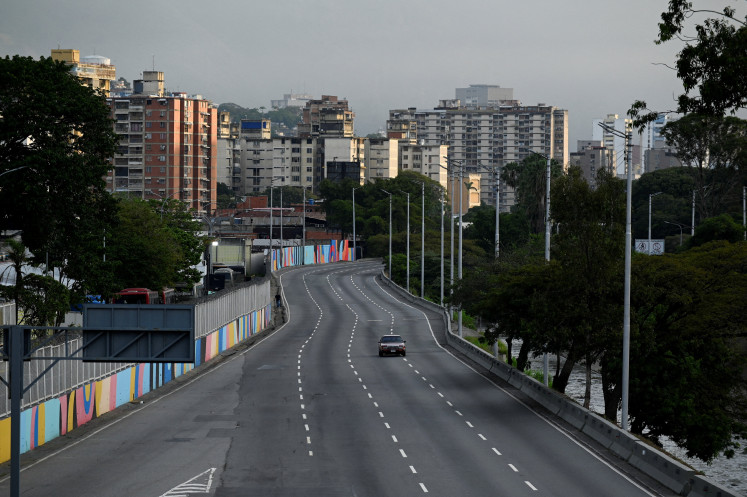Popular Reads
Top Results
Can't find what you're looking for?
View all search resultsPopular Reads
Top Results
Can't find what you're looking for?
View all search resultsQuestioning a theistic, secular Pancasila to protect religions
Since its introduction to Indonesian polity 70 years ago today, Pancasila has faced challenges ,particularly in equally protecting all religions in Indonesia as enshrined in its first principle, Belief in One Supreme God
Change text size
Gift Premium Articles
to Anyone
S
ince its introduction to Indonesian polity 70 years ago today, Pancasila has faced challenges ,particularly in equally protecting all religions in Indonesia as enshrined in its first principle, Belief in One Supreme God.
This principle can be called a theistic secular principle based upon belief in One Supreme God, but leaves it open to interpretation about which God is meant, thus accommodating, potentially, 'all belief systems' present in Indonesia.
The God and religion in Pancasila are inclusive as they refer to a multifaith God and religion. It can
also refer to a theistic God and a theistic religion. Thus, all Indonesians have an equal right to interpret God and religion as long as it is in accordance with the spirit of pluralism as one significant foundation of the state.
This principle shows a plurality-sensitive religious state philosophy, which is that the ideals of every religious denomination can be realized, in the sense that the state allows and assists its citizens to enjoy their respective religious freedom.
The significant function of the theistic secular principle designates that religion in Indonesia is very popular and an integral part of people's daily life.
The adoption of Pancasila as the state ideology and supreme source of law was meant to compromise by making Indonesia neither a theocratic state per se nor a secular state based on the strict French laicité (secularism) sense of the word.
Thus, Indonesia is portrayed and perceives itself as a theistic secular democratic state, which does not hold onto a particular religion because Indonesia is basically built on the foundation that the nation is and will always be a religious-pluralistic country.
This dynamic diversity cannot be preserved if the state is built on the basis of monolithic religious belief.
The theistic secular principle asserts the element of religions in the development process in post-independence Indonesia.
Thus, Indonesia upholds secularism in its legislation but at the same time considers the significant role of theistic religion in the public sphere. Under this principle, there should be no priority in religion because the state equally recognizes all religions and no religious labelling such as mainstream religion, heretic or blasphemer, even though heterodoxy is a common feature of religion.
History, however, shows that the theistic secular principle of Pancasila has been interpreted in relatively open ways but has always heavily depended on the government of the day and the society in a particular era. For example, Sukarno, a strident supporter of Pancasila, had a very controversial legacy by enacting Presidential Decree No. 1/1965 on the Blasphemy Law, which restricted non-mainstream religious teachings.
Since then the law has been used to discriminate against non-mainstream religions with some religions given privileges while others are excluded.
The Blasphemy Law may reduce the inclusive character of religion and God in Pancasila because it authorizes the state and mainstream religions to set boundaries on what is true doctrine and determines 'official interpretation' to
label non-mainstream religious teachings as deviant.
This means that when the state engages in defining what is true and what is a wrong belief, the state then acts as the guardian of 'official religions'.
According to majority religions, the law is to interpret the theistic secular Pancasila because this principle is too broad. If every person can interpret this principle based on his or her belief, it endangers public order, national stability and religious pluralism itself.
Thus, they argue that there must be a more specific law to protect the rights of religious believers of established religions and religious harmony.
The term 'religious harmony' has, however, been abused by the majority to protect their own interests, namely religious orthodoxy and the very essence of their version of religious life. Consequently, this law has along ago been used to silence dissident religious groups.
The old, new and Reformasi regimes persecuted many non-mainstream religious believers, including their freedom of expression. Since the expansion of decentralization law in the Reform Era, some local governments have also enacted laws that limit or ban some non-mainstream religions.
These cases assert that the theistic secular principle encounters sociolegal complexity because of the influence of religious orthodoxy and an interwoven legal system. In many cases, the majority religion still has a peculiar status because it is often placed as a sacred canopy, including the interpretation of Pancasila.
Until very recently, some religious believers still preferred to keep the monolithic interpretation of religious teachings rather than admitting various interpretations of religions.
As a consequence there is no room for minority religions, especially religious minorities within a particular official religion, because this kind of religious hermeneutic is claimed as the defamation of religious orthodoxy as part of public order.
The theistic secular Pancasila is required because the state has to act as guardian of religious life and because religion and state are not constitutionally separated.
Thus, the theistic secular approach provides room for Indonesian people to choose and practice their religion or belief but at the same time allows the government to equally intervene in people's religious life to protect public order.
So, if we agree that the persecution of minority religious groups is solely influenced by religious and sociopolitical reasons, do we also agree that the theistic secular principle of Pancasila as the supreme source of law to protect religious minorities in Indonesia is operating like a bowl without substance?
________________________
The writer studies at the School of Oriental and African Studies at the University of London and is writing a PhD dissertation titled Protecting religious minorities within Islam in Indonesia: A challenge for international human rights law and Islamic law.










